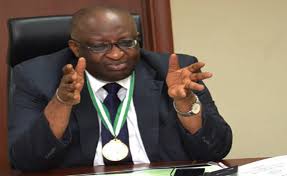The Director-General, West African Institute for Financial and Economic Management (WAIFEM), Prof. Akpan Ekpo, has advised the Federal Government to formulate necessary implementation strategies that would help achieve the goals of its current economic diversification agenda.
The economist gave the advise a lecture titled ‘Diversification: Path To Sustainable Economic Recovery and Growth’ delivered at a forum in Lagos.
Ekpo explained that strategic thinking of government was important in the efforts to attract private sector investments into key sectors of the economy and sustainable growth and profitability of private enterprises and the nation’s Gross Domestic Product (GDP)
He said: “The private sector is an en0 the latter is second best. It is government that is an engine of development utilizing the benefits of growth to ensure equity and fairness. It is government that is concerned about education, health, employment, poverty and inequality, not the private sector.”
The former university don and administrator, pointed out that for economic diversification to be effective and sustainable there must be good governance embracing an economic blue-print which stressed development as top priority.
Specifically, he listed key economic drivers for successful diversification as including, economic blue-print, quality of leadership, macroeconomic stability, political will, capacity building and training, competitive federalism, peace and stability, amongst others.
Ekpo, a former Vice-Chancellor of the University of Uyo, Akwa Ibom State, canvassed the need for a clear economic blue-print with the understanding that the federal and state governments had agreed to foster economic co-operation among their respective states divergences in their economic endowments.
On the role of visionary leadership in economic development, Ekpo pointed out that a visionary leader would galvanize the citizens for development and that his/her approach to governance wouldt his/her approach to governance would elicit support and enthusiasm from the followership.
According to him, the positive attributes of a good leader will permeate all other levels of leadership, adding that leadership within the context of good governance would drive the diversification process in the country.”
While stressing that macroeconomic stability is essential for diversification to take place, the WAIFEM boss said that “the economy must be managed to ensure moderate inflation, ensuring that macroeconomic fundamentals move in the right direction. This would enable potential and domestic investors to plan and weigh costs and benefits of investing in Nigeria.”
He explained further that political will remained “both a necessary and secondary condition for economic diversification to be effective and sustainable. Without political will, diversification would remain an exercise in futility.’
Ekpo hinged the imperative of diversifying the nation’s economy on sundry reasons, including the sluggish growth of Gross Domestic Product (GDP), the high rates of unemployment and inflation and rising misery indices.
Others are, low performance of the manufacturing sector, traditional agricultural practice and high rate of poverty, among others.






